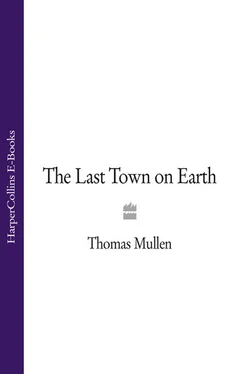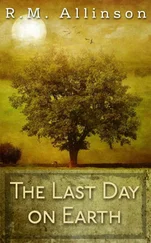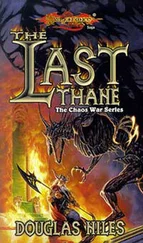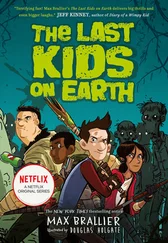Hours later Graham sat at his kitchen table, roused from sleep once again by the sound of the gunshots, by the look on the soldier’s face. He was breathing heavily and his fingers twitched—it was a miracle he’d been able to leave the bedroom without waking Amelia. He put his head in his hands, hoping to steady them.
Graham had never killed anyone before. Never even shot at anyone. He’d broken his share of noses and ribs, he’d tussled and come out on top more than a few times, but he’d never crossed that line. You did the right thing, he told himself. There are hundreds of people breathing right now who can thank you for those breaths. He told himself that the right thing was often hard, and confusing, and fraught with peril, but he damn sure had done the right thing, so he just needed to calm down, breathe slow.
Ain’t nothing a man has can’t be taken away. Damnedest truth there ever was. All that one has could vanish—whether in an instant, with frightening speed, or across a lifetime, with decay so slow no eye could detect it. But with Graham it had come as quick as a breathe, and he would never, ever let that happen again.
He had so much to protect. He thought of his wife and daughter, the warm weight of the baby in his arms. The way she slept so peacefully, it was as though all the strife that had preceded her birth had abruptly and forever ceased to exist.
He had never known what he wanted until that day on Puget Sound, with the sun reflecting off the waves and the mountains hovering like benevolent spirits in the background. He was twenty-three then, six years after he’d left home when a fight with his father had gotten out of hand. He’d been riding the rails for years, had picked fruit in California and seen the bowels of the earth in the Montana mines, had been beaten up by railroad bulls who thought he was at worst a Wobbly or at best another bum come to ruin their towns.
Not long after leaving his family in Kansas, he’d fallen in with a friendly bunch who taught him how to bum rides on the train, how to avoid the railroad bulls and the town cops, how to find out where the next job was and how to get there. Taught him which job sharks you could trust and which would only take your money and then drive you to some godforsaken field where there was no job at all, just a handful of other bindle stiffs who’d been shaken down. Taught him how to hide your money when you slept on a train car, how to protect yourself in a flophouse, how to keep the bedbugs from getting to those places you really didn’t want them. After only a couple years, it was as if Graham had been doing this all his life, and soon he was the one teaching the younger runaways and roustabouts, showing them how to survive, how to take the punches and keep on walking, grinning all the while.
But the romance wore off fast, as the bosses got meaner, the pay got lousier, and the food at the work camps got worse. Graham remembered the time he ran out of Spokane after a strike got ugly, remembered sitting on the train as the sun was rising over the Sawtooth Mountains, the air bracingly cold and so clean. He remembered sitting there and taking in all the beauty that God had laid out before him and wondering just what he was supposed to be doing in it. Surely he had a purpose, a reason for existing in a place as maddeningly beautiful as this, but what? His life had been a series of responses and reactions, nothing more. He’d hear about a job and take it. He’d get some jack and spend it. A strike would hit the town and he’d leave. Somebody’d call him a name and he’d throw a punch.
Until Everett. The playground of second-tier timber barons who thought they were industrial magnates of the highest order, Everett was a quickly growing town with no shortage of jobs. Time had passed in an almost seasonless blur. After a year or so, Graham’s buddy Matt told him how he could make more if he worked in a shingle-weaving plant; Matt could put in a good word with the foreman and teach him how to do the work without losing a finger or two. Graham was desperate to create something completely his own, and saving some money would be exactly that. So he made the switch to sawyer, but it was harder work, in its way. Rather than living out in the woods beneath the persistent rains and leaning in to his end of a crosscut saw, Graham was hunched in a stuffy building manipulating pieces of wood through those terrifying machines. Some days he manned the tall gang saws whose vertical blades ingested fat logs and spat them out as perfect strips of wood, and other days he navigated the band saws, long winding strips of metal thin as ribbon but topped with steel teeth that cut the strips down further. Just keep those teeth away, he’d think, while inhaling all that sawdust and getting it in his eyes and squinting and wanting to rub them clean but resisting because one false move would mean—
Losing a finger. One day he’d been seized by a dust-induced coughing fit so violent that his left arm flew out where he knew damn well not to let it go, and when his hand came back, it had only three fingers and the thumb. It wasn’t even his—it was someone else’s, some odd misshapen thing, the last knuckle looking so weirdly prominent. And then the knuckle spurted an explosion of red like some Cascade volcano erupting to hideous life, and the red ran down the rest of the hand and he finally recognized it—good Lord, that is my hand, and there ain’t no pinkie.
The man next to him, who should have been concentrating on his own work and was lucky he didn’t lose any fingers of his own, looked up and shouted something Graham didn’t hear. Matt came over from his usual station, wrapped a rag around Graham’s hand, and took him to see the doctor. Matt was saying things that Graham couldn’t hear—he’d shut down so that his body could concentrate on the feeling of shuddering pain, waves of pain, an entire hideous universe of pain that sucked itself thin and jammed itself into the tiny hole that his finger had left behind. The pain cut through his hand, his arm, it made his shoulder throb and his back ache. The doctor hit him with some morphine and finally he could think, could get beyond the strictly animal instincts to which his mind had become subordinated. He concentrated on breathing while the doc sewed him up and told him how to take care of the wound and what to expect from his new, three-fingered hand.
“This happens a lot, huh?” Graham had asked. It was the first thing he’d said since the finger flew off.
“To shingle weavers? Yeah.” The doc, an older guy who had sewn shut countless gaping knuckles, fidgeted with his glasses. “How long you been on the job?”
“Four months.”
The doc nodded. “Usually happens sooner than then. Law of averages catches up to you eventually.”
Graham didn’t know what the law of averages was, but he didn’t like how the doc was treating him as if the accident were something he deserved. Maybe it was just the morphine. Nothing seemed quite right, not the too-white pallor of the doc’s skin or the too-dark indigo of the midday sky beyond the windows or the lack of feeling beyond Graham’s left wrist.
The doc told Graham what he owed. It was roughly two weeks’ pay, which was more than he had. Graham stuttered a bit, but the doc had heard this before and cut him off. “How much can you pay at the end of the month?”
They worked out a deal, a payment plan on the finger Graham no longer had. With that settled, Graham bade the doctor good day and headed outside.
The doc’s house was on a paved road not far from the center of town, just a few blocks away from the rowdy saloons that had been the focal point of a town outcry a few years earlier, or so Graham had been told. What you need is a drink, Graham told himself, but he knew he needed to go back to the mill and explain himself. Find out how much pay he was going to be docked for leaving early.
Читать дальше












